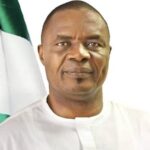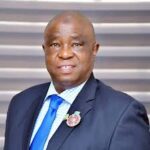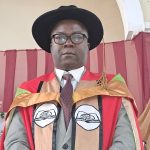By Chidiebere Ugwu
Federal Government is currently working with the National Council on Power (NCP) to develop and send the implementation strategy to the Federal Executive Council (FEC) for approval, the Minister of Power, Chief Adebayo Adelabu has said.
The Minister dropped the hint at the occasion of the 3rd Edition of the Power Correspondents Association of Nigeria (PCAN) which held in Abuja on Thursday.

Chief Adelabu said the move is a key part of the 2023 Electricity Act is the development of the Integrated National Electricity Policy and Strategic Implementation Plan.
“A key part of the 2023 Electricity Act is the development of the Integrated National Electricity Policy and Strategic Implementation Plan. On this, we are working with the National Council on Power (NCP) to develop and send the implementation strategy to the Federal Executive Council (FEC) for approval.
Also, part of the strategy in our road map is the emphasis on the bottom-up approach, unlike the top-down approach of the past. The implication, with the bottom-up approach is that we will prioritize Metering, Distribution and Transmission infrastructure”.
Represented by the Director, Training, Transmission, Mr. Nosike Emmanuel, the Minister also called for end to power theft, vandalism of electricity installations and sabotage of the sector.
“For the sector to progress, we must advocate against power theft, vandalization and educate consumers against sabotage,” he said.
Chief Adelabu said, they are working with the National Council on Power (NCP) to develop and send the implementation strategy to the Federal Executive Council (FEC) for approval.
“Also, part of the strategy in our road map is the emphasis on the bottom-up approach, unlike the top -down approach of the past. The implication, with the bottom-up approach is that we will prioritize Metering, Distribution and Transmission infrastructure. We will focus on Customers down to distribution and transmission infrastructure in the short term, this is to ensure that a significant portion of what is generated currently gets to the end users.
“We will also pay attention to the generation segment particularly in areas of distributed (embedded) power from renewable energy sources, while at the same time, advancing base load power through thermal and hydro plants in the medium to long term. We will further explore our regional energy potentials,” he said.
The Minister noted that the government and the critical stakeholders, will focus on solar energy in the North, mini hydro power plants in the Middle belt and the Southwest, hybridized with solar while, coastal states will be identified for wind energy utilization.
He said that with the liberalization of the sector, Nigerians will soon start to experience the objective that led to the Act which is improved power supply across the country.
The Chairman, Power Correspondents Association of Nigeria (PCAN), Mr. Obas Esiedesa, said the workshop, from inception was intended to create an opportunity to build the capacity of journalists covering the Power sector, as well as create an avenue for journalists to interact with industry players and regulators.
He recalled that, “On November 1, 2013, the Federal Government handed over the distribution and most generation assets to the private sector, marking the beginning of private investment into the Nigerian Electricity Supply Industry”.
The Chairman regretted that expectations raised by the entrance of private entrepreneurs into the sector have largely remained unmet.
According to him, “Ten years down the line, the time has come for the Federal Government to take a holistic review of the entire Power sector privatization. Not necessarily taking away the assets from operators, but finding solutions to the huge challenges facing the industry. It is worrying to note that with over 13,000 megawatts of installed capacity, the industry is still struggling to deliver 4,000MW of electricity on a consistent basis. That is why as a group, we welcome the new initiative by the Minister of Power, Chief Adebayo Adelabu, that has specifically targeted the distribution sector and the consumers”.
He said that transmission and distribution networks remain the biggest obstacles to efficiency and effective electricity supply in the country.
Mr. Esiedesa, also called for sincerity in the implementation of the new initiative.











